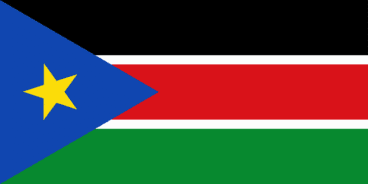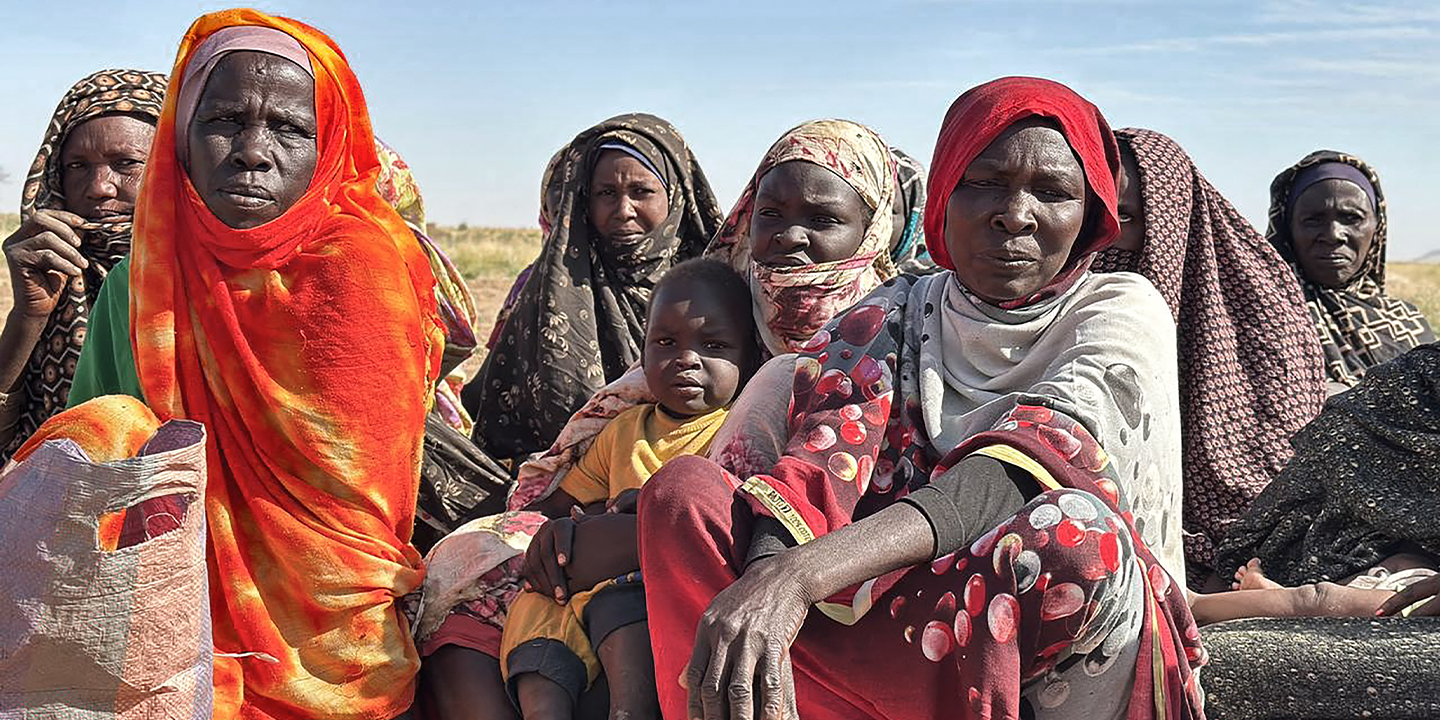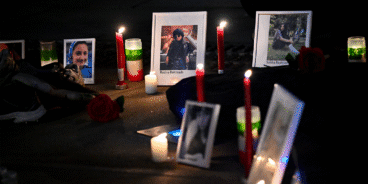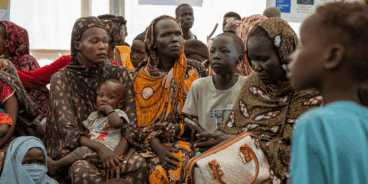

Atrocity Alert No. 427: Sudan, Democratic Republic of the Congo and Afghanistan
Atrocity Alert is a weekly publication by the Global Centre for the Responsibility to Protect highlighting situations where populations are at risk of, or are enduring, mass atrocity crimes.
RSF LAUNCHES DEADLY ATTACKS ON ZAMZAM IDP CAMP, NORTH DARFUR
Since 11 February the paramilitary Rapid Support Forces (RSF) have made significant advances in North Darfur, Sudan, and launched a ground offensive on Zamzam, the largest displacement camp in the region, as well as on surrounding communities. At least seven people have been killed and 40 injured between 11 and 14 February, according to Médecins Sans Frontières. The actual figures are likely significantly higher. During the attacks, which included heavy weapons, artillery shelling and small arms, the RSF also set fire to the camp’s main eastern market. The Yale School of Public Health’s Humanitarian Research Lab (HRL) confirmed that arson attacks and structural damage have been concentrated in the camp’s eastern areas. The HRL has also documented evidence of likely airstrikes and an arson attack targeting a community 2.5 km from Zamzam camp, including a possible strike on a water point or distribution site where civilians gather.
The attack on Zamzam comes amid the ongoing battle for El Fasher – the last remaining state capital in Darfur not under RSF control – which has been under siege since April 2024. Since then, experts have warned that the RSF’s advances in and around El Fasher could lead to atrocity crimes, particularly against displaced communities in surrounding areas. Zamzam, located south of El Fasher, has long been identified as a likely target due to its strategic position, the presence of armed actors and the RSF’s repeated history of attacking displacement camps.
The RSF’s attacks on Zamzam – a camp sheltering hundreds of thousands of people, predominantly from the Zaghawa community who were displaced during the 2003-2005 genocide – appears to be a continuation of their systematic campaign of ethnic cleansing against non-Arab communities, potentially amounting to genocide. In response to the attacks on Zamzam, on 14 February the UN Office on Genocide Prevention and the Responsibility to Protect stated on X (formerly Twitter) that “identity-based targeting of a specific ethnic group mirrors past violence and presents strong risk factors and indicators of genocide.”
UN Secretary-General António Guterres stressed on X that “Sudan is being torn apart before our eyes…” and implored the international community to come together “to stop the flow of weapons and the bankrolling of bloodshed.” The UN Security Council (UNSC) must urgently address the escalation in Zamzam and adopt measures to protect civilians and prevent further harm. Those with influence over the RSF, including the United Arab Emirates, must pressure the group to end its campaign of ethnically motivated killings, allow humanitarian access and commit to a ceasefire. The international community, including the UNSC, African Union and UN member states, must use diplomatic pressure, sanctions and public condemnation to push all parties to stop the violence immediately.
M23 SEIZES SOUTH KIVU’S CAPITAL, CONSOLIDATING CONTROL OF EASTERN DRC
Following a sharp escalation in fighting since late January, the Rwanda-backed March 23 Movement (M23) armed group seized the capitals of North and South Kivu provinces in the Democratic Republic of the Congo (DRC), consolidating control over the mineral-rich eastern region in under a month. Reportedly facing little resistance by Congolese authorities, M23’s capture of Bukavu, South Kivu’s capital, on 13 February increases risks for civilians amid a growing security vacuum.
Since 26 January nearly 3,000 people have been killed and 2,800 others injured. According to the UN Refugee Agency, heavy artillery shelling and looting have destroyed 70,000 emergency shelters around Goma and Minova in North and South Kivu provinces, leaving approximately 350,000 displaced people without adequate shelter. The UN Children’s Fund Executive Director, Catherine Russell, warned that grave violations against children, including recruitment, abduction and sexual violence, have rapidly increased and are “surpassing anything we have seen in recent years.” Between 27 January to 2 February the number of rape cases treated across 42 health facilities increased five-fold, with 30 percent of victims being children. The Office of the UN High Commissioner for Human Rights (OHCHR) has confirmed cases of M23 perpetrating summary executions of children.
OHCHR has also reported shootings and criminal acts involving armed individuals and escaped prisoners from the Kabare and Bukavu prisons. OHCHR has received protection requests from victims and witnesses as they fear retaliation from escapees due to their participation in trials against some prisoners who have been convicted of grave human rights violations and abuses. Journalists, human rights defenders and members of civil society organizations have also been threatened and forced to flee.
In response to the deteriorating crisis, on 7 February the UN Human Rights Council held a special session at the request of the DRC government and unanimously adopted a landmark resolution that urgently establishes a fact-finding mission (FFM) and Commission of Inquiry (CoI). These mechanisms are mandated to investigate and report on the serious human rights violations and abuses and violations of International Humanitarian Law committed in North and South Kivu provinces since January 2022. The establishment of both the FFM and CoI sends a strong message from the international community about the need to end the cycle of impunity that has fueled ongoing armed conflict and atrocities in eastern DRC. These mechanisms are crucial for advancing justice by identifying those responsible for grave crimes and supporting the rights of victims and survivors to truth, justice and reparations.
The UN Humanitarian Coordinator in the DRC, Bruno Lemarquis, said, “It is imperative to put an end to the confrontations and to resume the path of dialogue and political processes. The population can no longer continue to pay such a heavy price for a conflict that continues to spread and now threatens the stability of the entire region.” All parties should ensure safe humanitarian corridors, protect civilians and seek a peaceful resolution to the conflict. The DRC’s sovereignty must be respected and Rwandan forces should withdraw from the country.
PAKISTAN ESCALATES FORCED REPATRIATION OF AFGHAN REFUGEES
Pakistan has intensified its crackdown on Afghan citizens residing within its borders following Prime Minister Shehbaz Sharif’s recent approval of a multistage repatriation plan. The directive, issued in January, affects nearly three million Afghans, including legally recognized refugees, documented and undocumented migrants and individuals awaiting relocation to the United States and other Western countries. The latest measure requires tens of thousands of Afghans to relocate from Islamabad and neighboring Rawalpindi by 31 March or face deportation to Afghanistan. Many refugees reside in Islamabad and Rawalpindi because of the embassies and refugee agencies based there. Additionally, Sharif has assigned the foreign ministry with expediting the relocation of individuals awaiting asylum to third countries. If these efforts fail, they too will be forcibly repatriated.
This policy shift builds upon the Pakistani government’s controversial Illegal Foreigners’ Repatriation Plan of 2023, under which approximately 800,000 Afghans were either deported or pressured to leave. Human rights organizations and UN agencies have widely criticized the policy, warning that it violates international refugee and human rights law and puts returnees at severe risk of persecution, violence and economic destitution in Taliban-controlled Afghanistan. The situation has further deteriorated in 2025, with the UN Refugee Agency (UNHCR) and International Organization for Migration documenting the deportation of over 800 Afghan nationals, including children, from Islamabad and Rawalpindi alone since 1 January.
The latest forced repatriation measures come despite the UNCHR’s non-return advisory, which has been in place since 2021 and calls for a halt to all forced returns of Afghan nationals due to the severity of risks they face. Fearing persecution following the Taliban’s takeover of Afghanistan in August 2021, hundreds of thousands of Afghans fled to Pakistan, but have subsequently faced waves of arbitrary detentions, arrests and the threat of deportation. The government of Pakistan estimates 600,000 Afghans have sought refuge in the country since 2021. Fear of deportation has forced many Afghans to live in hiding, unable to access employment, healthcare or education. Pakistani officials justify the crackdown and mass detentions as necessary for national security and economic stability; however, the policy disproportionately impacts vulnerable populations.
Julia Saltzman, Afghanistan expert at the Global Centre for the Responsibility to Protect, said, “Afghanistan is facing a worsening humanitarian crisis, with the Taliban imposing increasingly repressive policies that endanger those sent back. Many returnees will likely face arbitrary detention, enforced disappearance and systematic discrimination, especially women and girls, ethnic and religious minorities, journalists and human rights defenders.”
Pakistan must urgently halt forced deportations and uphold its commitment to non-refoulement, ensuring that no Afghan refugee is forcibly returned to persecution or harm. The international community must not only provide effective protection and assistance to those facing displacement but also address the root causes of their forced migration, including human rights violations perpetrated by the Taliban de facto authorities and the threat posed by other armed extremist groups in the region.
Related Content


Atrocity Alert No. 468: Iran, Ethiopia and Afghanistan
